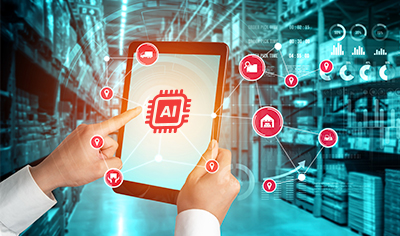Picture yourself waking up in the year 2025. Your coffee maker precisely knows when to begin brewing, your digital assistant has organized your day, and your car takes you to work while you get updated on the recent news. Seems like a sci-fi tale? Interestingly, it’s closer to the truth than you realize. Here are some of the leading technology trends that will influence our future in 2025.
1. Agentic AI: The Autonomous Workforce
Agentic AI is poised to transform the workplace. These autonomous systems can plan and perform activities to meet user-specified objectives. Consider them your virtual team, managing tasks ranging from customer support to data analysis. Gartner anticipates that by 2028, 15% of everyday work choices will be made independently by these systems. Continue reading to discover how this will alter your professional life.
2. AI Governance Platforms: Keeping AI in Check
With great power comes significant responsibility. AI governance platforms ensure that AI systems function in a legal and ethical manner. These platforms manage policies, clarify AI choices, and foster trust by promoting transparency. By 2028, firms that implement thorough AI governance will see a 40% reduction in AI-related ethical issues.
3. Ambient Invisible Intelligence: The Unseen Helper
Consider technology that blends effortlessly with your surroundings. Ambient unseen intelligence employs intelligent tags and sensors to detect and track objects in real time. This technology will transform retail, logistics, and other sectors by 2027. The potential challenges of this tech trend might include addressing privacy concerns, obtaining user consent, ensuring data security, achieving interoperability, managing scalability, maintaining energy efficiency, controlling costs, and navigating ethical considerations. Users may also wish to disable tags to protect their privacy, potentially limiting the technology’s effectiveness.
4. Energy-Efficient Computing: Green Tech
Sustainability nowadays goes beyond just being a trendy term. Energy-efficient computing aims to minimize the carbon footprint associated with various technology operations. By the late 2030s, new hardware and algorithms will enhance the sustainability of computing. Picture a world where your technology usage contributes to saving the Earth. This new approach involves optimizing code and algorithms, creating more efficient architecture, deploying energy-efficient hardware, and relying on renewable energy. It’s estimated to help businesses meet legal, commercial, and social demands to reduce carbon footprints. However, this clearly requires new hardware, cloud services, skills, and toolsets, making the transition complex and costly, with potential short-term increases in energy prices due to higher green energy demand.
5. Hybrid Computing: The Best of Both Worlds
Hybrid computing merges various computing, storage, and networking methods to tackle complex problems. It offers efficient, high-speed innovation, advanced AI capabilities, and enhanced automation, enabling real-time personalization and using the human body as a computing platform. However, it involves emerging technologies that need specialized skills, poses security risks, and requires significant investment and integration efforts.
6. The Convergence of Machine and Human Intelligence
AI is no longer just a future concept, it’s here now. By 2025, AI tools will create symbiotic relationships between humans and machines, enhancing daily tasks and augmenting skills. From generative video to autonomous AI agents, the intelligence revolution is just beginning. Imagine AI tools seamlessly integrated into your life, improving decision-making and creativity.
7. Cybersecurity at Global Scale
The threat of cyberattacks is immense, targeting everything from energy grids to healthcare infrastructure. In 2025, increased investment in cybersecurity infrastructure and collaboration between states will be crucial. AI systems will play a critical role in detecting and preventing attacks, making cybersecurity a critical element of national and global security.
8. A Quantum Leap in Computing Power
The year 2025 has been designated as the International Year of Quantum Science and Technology by the UN. Quantum computing will revolutionize fields like climate modeling, material discovery, and encryption. In 2025, cloud-based quantum computing will become more accessible, dramatically impacting our lives. Imagine quantum algorithms processing data for natural language processing and autonomous driving at unprecedented speeds.
9. Voice User Interfaces (VUIs): The Rise of Conversational AI
Voice User Interfaces are becoming more advanced, making technology interactions more natural. By 2025, VUIs will be integrated into more devices, from smart homes to cars, enabling seamless, hands-free control. Imagine asking your virtual assistant to book flights, adjust home lighting, or translate languages in real-time.
To Wrap Up
The future is bright, and these tech trends are just the beginning. From autonomous AI to brain-boosting technologies, 2025 promises to be a year of incredible advancements. Keep reading, stay curious, and get ready to embrace the future!





